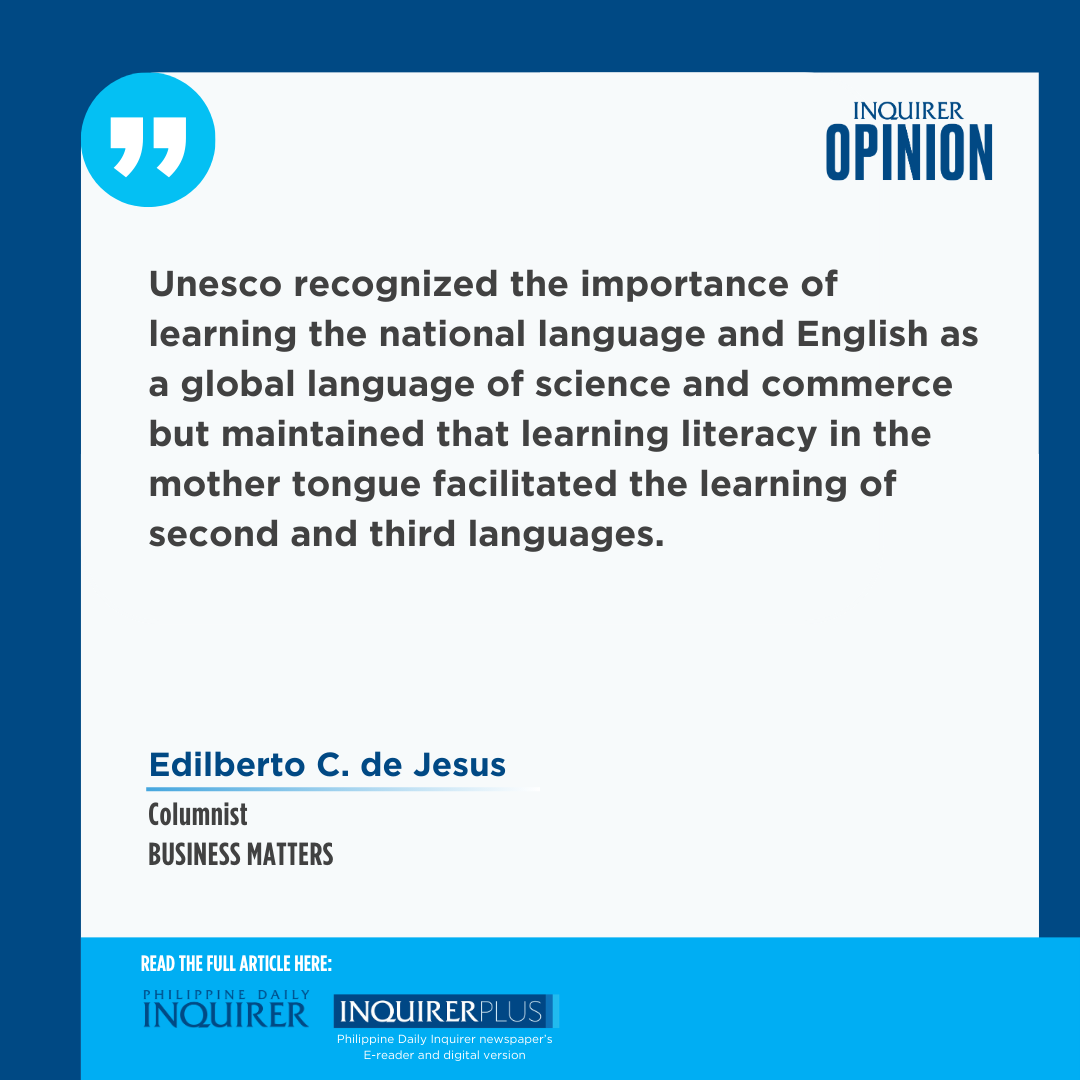The passage of Republic Act No. 10533 in 2013, requiring the use of mother tongue as medium of instruction from Kindergarten to Grade 3 and even up to Grade 6 was a cause for celebration. It aligned language policy to the Mother Tongue-Based Multilingual Education (MTB-MLE) that the United Nations Educational, Scientific, and Cultural Organization (Unesco) has been prescribing since 1953 and advocates in the Philippines by the ‘60s. With a doctorate in linguistics from University of California, Berkeley, De La Salle University president Br. Andrew Gonzalez, FSC, was among the early proponents of MTB-MLE. As the Department of Education (DepEd) secretary (1998-2001), he supported a pilot program with the help of the Summer Institute of Linguistics.
Last month, RA 12027, “discontinuing the use of the mother tongue as medium of instruction from kindergarten to Grade 3,” dropped the MTB-MLE mandate, after some 40 years of advocacy, 12 years of testing, and 11 years of implementation, with hardly a whisper. While there had been congressional deliberations and stakeholder consultations on the issue, the final draft apparently did not undergo any joint congressional deliberation. The House simply adopted Senate Bill No. 2457, “Redefining the application of the mother tongue as medium of instruction from Kindergarten to Grade 3.” With hardly any explanation of its rationale, RA 12027 simply lapsed into law.
The Philippines was one of the cases presented at the Unesco conference of language experts in 1951 because of the number of indigenous languages in the country, the identification as the national language of Filipino, which was not then the most widely spoken, and the already important role of English in the education system. Other countries faced even bigger problems, especially those whose languages used a different alphabet or orthography, or a larger number of language communities. Indonesia then, with about 70 million people and some 200 indigenous languages, had a population about five times that of the Philippines and more than twice its number of mother tongues.
Acknowledging these challenges, Unesco experts still reached a clear consensus. Taught in the mother tongue language of the home, what children learn in school can be more easily applied in the home. Parents can participate in the education of their child. As a vehicle of the culture, the mother tongue is also key to helping children more easily develop the context of what they are learning and the ability to form and handle concepts. Unesco recognized the importance of learning the national language and English as a global language of science and commerce but maintained that learning literacy in the mother tongue facilitated the learning of second and third languages. Reporting on efforts to reform basic education in member countries, it learned that “little or no progress could be made before a decision had been reached as to what language should be used as the medium of instruction.”
Thus, legislators could not dismiss the commonsense logic, the empirical evidence and science of the research, and the global success of MTB-MLE. Philippine test results in Programme for International Student Assessment (Pisa), from the Southeast Asian Ministers of Education Organization, and the World Bank assessment of learning poverty have underlined literacy as a critical, foundational element in the education of children and the crucial factor of the language used in the evaluation instruments. Moreover, its own Second Congressional Commission on Education (EdCom II) had acknowledged the importance of the MTB-MLE strategy for the country. But neither could the legislators ignore the widespread public recognition that MTB-MLE implementation had been a dismal failure. Despite MTB-MLE implementation in 2013, Filipino students continued to take the Pisa tests in 2018 and 2022 in English, both of which recorded hugely disappointing results in reading competence.
Action on this vexing dilemma was clearly imperative. RA 12207 was the congressional solution. Some critics may see this response as basically the legislators giving up and tossing the hot potato issue back to DepEd. Success has many parents; failure is an orphan, abandoned even by those who might have contributed to the outcome. More hopeful observers can argue, however, that the problem does properly belong to DepEd, which should accept its ownership and its accountability for fixing it. The risk in unloading the problem back to DepEd is that it does have responsibility for the MTB-MLE mess and it has not demonstrated in the last decade much capacity for overcoming its mistakes.
However, DepEd is playing a new game under a new management. Hopefully, it can take the RA 12207 ball and using the Unesco MTB-MLE and EdCom II playbooks, drive it through the goal posts.
—————-
Edilberto C. de Jesus is professor emeritus at the Asian Institute of Management.
—————-
Business Matters is a project of Makati Business Club (makatibusinessclub@mbc.com.ph).


